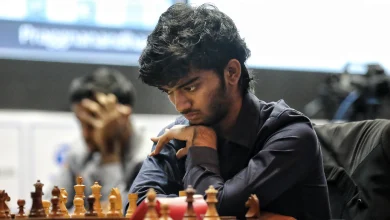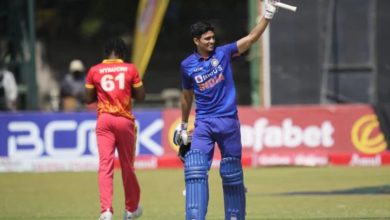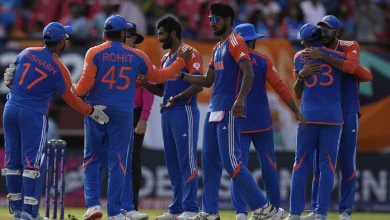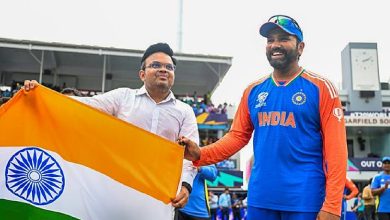Why Xhaka’s testicles-grabbing act and Shaqiri’s finger-on-lips has created a controversy in the Serbia vs Switzerland game?

Midway through the second half against Serbia, Switzerland’s Granit Xhaka was caught in a viral moment. He seemed to grab his testicles in an apparent insult directed towards the Serbia dugout. An old Albania-Kosovo-Serbia conflict caught in a pic. Xhaka would later dismiss talks of any tension on the field, but his act isn’t likely to be forgotten soon.
When his team-mate Sheridan Shaqiri, who was booed throughout Serbian fans, buried the ball into the net, he would celebrate putting his finger to his lips and then pointing to the name on the back of his shirt.
Granit Xhaka grabbing his nuts at the Serbian bench 🤣🤣 pic.twitter.com/hODzFsDnAq
— george (@StokeyyG2) December 2, 2022
Both Shaqiri and Xhakar created a furore in the 2018 football world cup, when they did an eagle salute after scoring goals, mimicking the black eagle on the Albanian flag. We have to dive into the past of the Balkan countries to understand why Xhaka and Shaqiri acts have been causing controversy.
It was a cold Sunday, February 17 2008. Temperatures had dipped to -10 degrees in the city of Prishtina, the capital of Kosovo, when people were hit a pleasant surprise: that the country had self-declared itself as an independent state after war against Serb-dominated Yugoslav forces in the late 1990’s.
The people were in the dark – there were whispers for a while, a momentum was building up and it seemed imminent but they weren’t sure about the date. Suddenly, they saw their prime miner Hashim Thaci appear on television and read out the independence declaration. Euphoria broke out in the city, and in the country. There was dancing and singing in the streets and people would retreat into coffee shops to warm themselves before re-joining the reverie. The sky was lit fireworks and the song that echoed most in the city was : “Oj Kosovë, oj nëna ime”(O Kosovo, o my mother).
Switzerland’s Xherdan Shaqiri celebrates after scoring his side’s opening goal during the World Cup group G soccer match between Serbia and Switzerland, at the Stadium 974 in Doha, Qatar. (AP)
It hasn’t been all smooth sailing though. Forget Serbia, Kosovo isn’t deemed an independent country even India. Russia and China don’t recognise it but the USA does – Over 100 countries recognise it as a sovereign state but it’s not a member of the United Nations. Serbia of course has resed sovereignty.
It’s in this context that the celebrations of the two Kosovo Albanian footballers in Switzerland during the game against Serbia need to be seen.
Xherdan Shaqiri and Granit Xhaka’s 2018 eagle salute isn’t traditionally just restricted to Kosovo. Ethnic Albanians make sign of pride all over Kosovo, Albania, Macedonia and in the diaspora. A few members of Switzerland’s playing XI have their roots in Kosovo, ethnically Albanian province.
” id=”yt-wrapper-box” >
Xhaka, whose father was a pro-Kosovo activ and was reportedly tortured in jail in the late 80’s Serbian regime, was the first to do the eagle salute in 2018 after scoring first in the second half. And it was him now, grabbing the testicles seemingly against the Serbian dug-out.
Xhaka’s father had taken part in a political demonstration against the former Yugoslav government and was imprisoned for 7 years. Sharing a cell with four other men, he would be let out for just 10 minutes every day. On release, he emigrated with his family to Switzerland. Xhaka ended up playing for Switzerland while his brother Taulant plays for the Albania national team.
Switzerland’s Granit Xhaka clashes with Serbia’s Vanja Milinkovic-Savic, Nikola Milenkovic and Strahinja Pavlovic. (Reuters)
Shaqiri would silence the crowd with his finger-on-lips gesture. When he was four, his family moved to Switzerland just before the war broke out. His father started washing dishes in a restaurant before he found a job as a construction worker. His mother worked as a cleaner in office buildings in the city. His brothers helped the mother cleaning the windows, and Shaqiri helped her with the vacuum cleaner. In 2012, when Switzerland played Albania, Shaqiri had flags of Switzerland, Kosovo, and Albania on his boots.
Even before the 2018 world cup Shaqiri had posted a photo on his Instagram account displaying the boots he would wear. The flag of Switzerland was on the left boot’s heel; on the right, there was the flag of Kosovo, “Don’t worry though, the Swiss flag is on my left foot.”
Switzerland’s Xherdan Shaqiri celebrates scoring their first goal with Granit Xhaka. (Reuters)
Kosovo’s national football team was officially recognised FIFA in 2016, and it provided an opportunity to Serbian striker Aleksandar Mitrovic to have a dig about Shaqiri’s boots. “If he loves Kosovo that much and never misses a chance to flaunt the flag, why did he refuse a chance to play for their team?”.
In 2014, in the Euro qualifier between Serbia and Albania, who visited Belgrade for a football game for the first time after 1967, a drone flew above the pitch in the 40th minute of the game. It lowered a flag, bearing an insignia of ‘Greater Albania’ . The flag was caught Serbian defender Stefan Mitrovic but two Albanian players Andi Lila and Taulant Xhaka. Crowd violence soon followed, and the game had to be abandoned.
Football and peaceful past in Kosovo-Albania
Kosovo Albanians haven’t always had a violent relationship with football. In fact, at the height of conflict in the 90’s with the Serbian regime, a non-violent resance emerged through football.
In his book Civil Resance in Kosovo, Howard Clark writes about how the Albanian villages gave their football teams names as Durin (Endurance) and Qendresa (Standing firm). The Milosevic regime had removed Albanians from jobs in cultural and sporting institutions, and a non-violent resance broke out. In response, they set up a parallel football league and it continued peacefully despite frequent police harassment. All that’s in the past.







